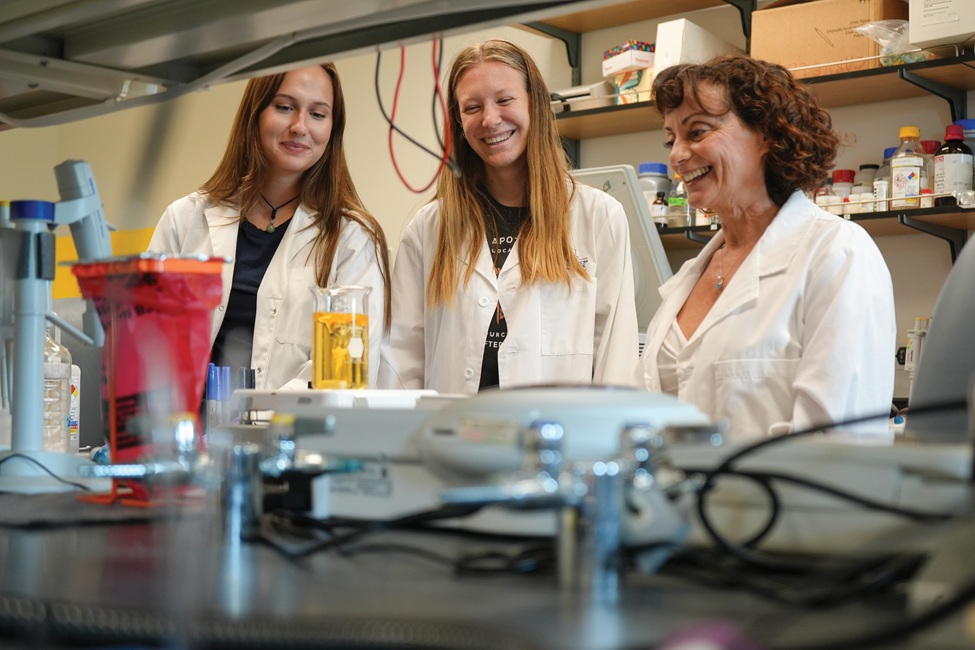FAU Receives NIH Grant to Investigate Amphetamine Addiction

(From left): FAU students Katie Poquette and Nicole Litvinchuk in the lab with Lucia Carvelli, Ph.D.
Lucia Carvelli, Ph.D., associate professor of neuroscience at Florida Atlantic University’s Harriet L. Wilkes Honors College and a member of the FAU Stiles-Nicholson Brain Institute, has received a $571,675 grant from the National Institutes of Health to advance critical research into how amphetamines affect brain function. Her work could pave the way for new therapies targeting substance use disorders and dopamine-related neurological conditions such as ADHD.
Amphetamine and its derivatives – including methamphetamine – are among the most widely abused drugs worldwide. In the United States alone, more than 32,000 deaths were attributed to amphetamine-involved overdoses in 2021. While Adderall is frequently prescribed to treat attention-deficit hyperactivity disorder, it also is misused, particularly by college students seeking cognitive enhancement. Excessive use can lead to serious side effects including insomnia, cardiovascular complications, addiction and even death.
This project represents a critical step forward in the fight against amphetamine misuse and its devastating consequences. Through a combination of innovative methodology, accessible model systems, and rigorous scientific inquiry, the research team is pushing the boundaries of addiction neuroscience while training the future leaders of the field.
“Despite decades of scientific investigation, major gaps remain in our understanding of amphetamine’s effects on the brain,” said Carvelli. “Existing studies have shown that amphetamines alter the dopaminergic system – an essential brain pathway that regulates reward and motivation – but the full range of molecular mechanisms remains unclear.”
Carvelli and her team will address this challenge by using a genetically tractable model organism: the microscopic roundworm Caenorhabditis elegans (C. elegans). With just 302 neurons, including eight dopaminergic neurons, C. elegans offers a simplified yet powerful system for dissecting the cellular pathways impacted by amphetamines.
In previous work, Carvelli’s lab discovered that amphetamine causes a dopamine-dependent behavior called Swip (swimming-induced paralysis) in which C. elegans – worms become immobilized when treated with a swim in a solution containing amphetamine. This behavior is triggered by an excess of dopamine in the synaptic space and has proven to be a reliable indicator of amphetamine’s effects at the neuronal level.
Building on these findings, the newly funded research will pursue two major objectives. First, Carvelli’s lab will identify novel regulators of dopamine release during amphetamine exposure. Using the Million Mutation Project – a genetic library of C. elegans strains with well-documented mutations – the team has already identified 10 strains that exhibit abnormal Swip behavior even without amphetamine exposure.
Interestingly, none of these strains carry mutations in known dopamine-related genes such as tyrosine hydroxylase, the dopamine transporter, the vesicular monoamine transporter, or the dopamine receptor DA2R. This suggests that previously unidentified genes may be playing a role in dopamine regulation. The team will perform detailed genetic and behavioral analyses to uncover these novel contributors.
The second goal is to identify genes that mediate amphetamine’s effects independently of the traditional dopamine release pathway. Preliminary results from the Carvelli lab have revealed a mutant strain that lacks Swip at baseline and fails to respond to amphetamine. Genetic sequencing of this strain uncovered a mutation in let-363, the C. elegans equivalent of the human mTOR gene – a known player in amphetamine signaling.
Using a combination of genetic knockouts, pharmacological inhibitors and behavioral assays, the research team will test whether let-363 and other similar genes are necessary for amphetamine-induced behaviors that bypass traditional dopamine release mechanisms.
By identifying genes and molecular pathways that either regulate dopamine release or act independently of it, Carvelli’s work opens the door to new therapeutic strategies for treating amphetamine addiction and other dopamine-related neurological disorders. Moreover, the study offers an invaluable training ground for FAU undergraduates, many from varied backgrounds, who will gain hands-on experience in cutting-edge neuroscience research.
“Our work will not only expand our understanding of how amphetamines affect the brain, but it will also uncover completely new biological targets that could lead to safer, more effective treatments for substance use disorders,” said Carvelli. “Equally important, we’re providing a meaningful research experience for undergraduate students, many of whom will become the next generation of neuroscientists.”
//
-FAU-
Latest News Desk
- 'Frazzled' Fruit Flies Help Unravel How Neural Circuits Stay WiredFAU scientists have discovered that the protein Frazzled (DCC in humans) fine-tunes neuron connections, keeping signals fast and precise - key to a fruit fly's rapid escape reflex and healthy nervous system.
- FAU Innovation Pilot Awards Drive Faculty Research from Lab to MarketThe FAU pilot program offers $500 to $15,000 in seed funding to help researchers turn early discoveries into market-ready technologies, fostering prototypes, industry partnerships and real-world impact.
- Nearly 70 FAU Faculty Named Among World's Top 2% of ScientistsNearly 70 FAU faculty are ranked among the world's top 2% of scientists by Stanford-Elsevier, recognizing their global research impact across 22 fields and 174 subfields from engineering to humanities.
- FAU to Celebrate 'Homecoming: Paradise Island'Florida Atlantic University will celebrate "Homecoming: Paradise Island" beginning Thursday, Oct. 30 through Saturday, Nov. 8.
- FAU Researchers Make Great 'Strides' in Gait Analysis TechnologyA first-of-its-kind study explored whether more accessible technologies such as a 3D depth camera could accurately measure how people walk, offering a practical alternative to traditional gait analysis tools.
- FAU Establishes Professorship in Jain StudiesThe Department of Philosophy recently announced the establishment of the Bhagavan Sambhavnath Endowed Professorship in Jain Studies.






